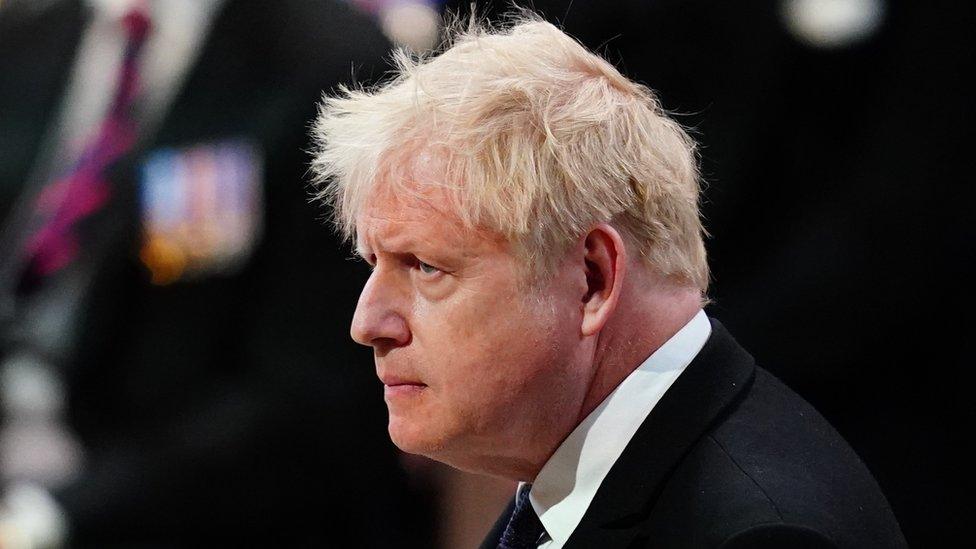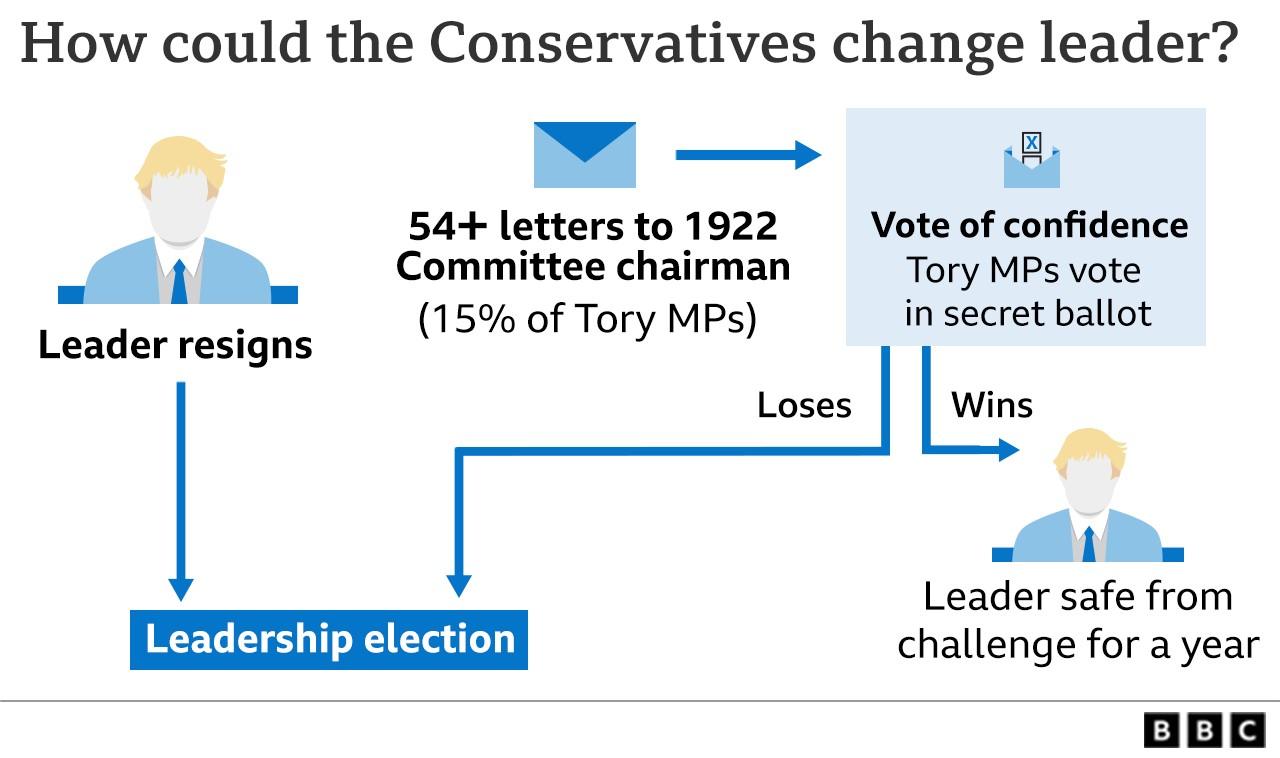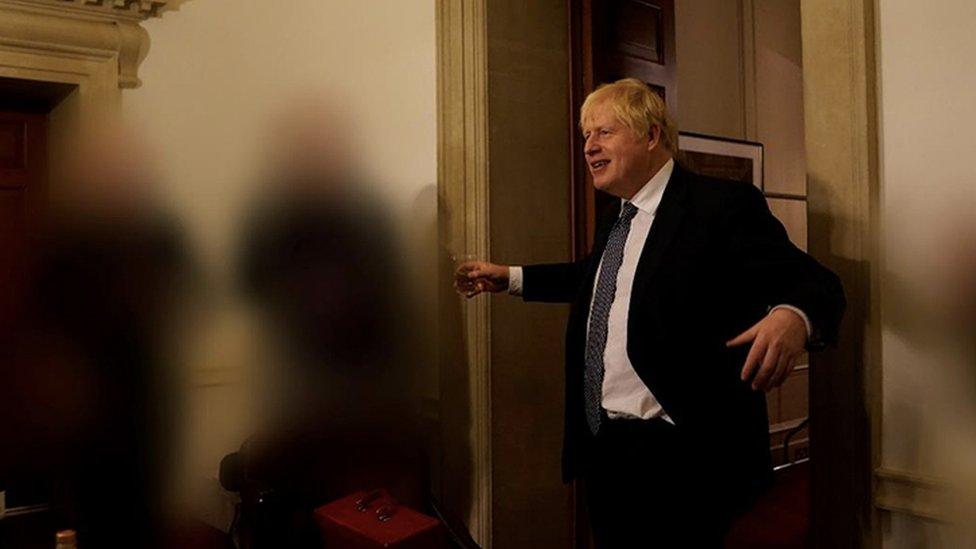Confidence vote: Jeremy Hunt urges Tories to oust PM as ministers rally
- Published
- comments

Former cabinet minister Jeremy Hunt has urged Tory MPs to vote against Boris Johnson in Monday's vote on his leadership, as the PM and his allies seek to galvanise support.
The former health secretary said he would be "voting for change" in the confidence ballot.
Scores of Tory MPs angry about Partygate and other issues wrote to party bosses to trigger the vote.
But ahead of the vote, the PM vowed to lead Tory MPs "to victory again".
If most Tory MPs vote to express no confidence in him, Mr Johnson will be ousted from office and a contest will be held to replace him as leader of the party and PM.
Assuming every Conservative MP casts a vote and nobody abstains, this means 180 will have to vote against Mr Johnson to topple him.
The vote has taken place is Parliament, with a result announced on Monday evening.
In a meeting of Tory MPs in Parliament before the vote, the prime minister warned that a "pointless fratricidal debate" risked letting Labour into government and promised that "the best is yet to come".
He hinted at tax cuts and pointed to previous achievements, such as delivering Brexit and support for Ukraine in its war against Russia.
Former Brexit minister Steve Baker said although the PM had made a "strong case" for his leadership and was likely to win, he would still vote against him.
In contrast his Tory colleague Brendan Clarke-Smith said there were "a lot of claps for the prime minister", who addressed issues around Partygate, integrity and trust.
In a letter sent to Tory MPs earlier, Mr Johnson said putting their confidence in him would "put an end to the media's favourite obsession" and allow his government to focus on voters' priorities.
Confirmation of the no-confidence vote comes after more than a week of speculation over the PM's future.
Discontent among Tory MPs has grown since a highly critical report into lockdown parties in and near Downing Street during the Covid-19 pandemic was published last month.
An interim version of the report, written by senior official Sue Gray and published in January, prompted a trickle of Tory MPs to urge Mr Johnson to stand down.
But the full version, which laid bare the scale of Covid rule-breaking in No 10, has led to renewed calls within the party for him to resign.
There has also been unhappiness within the party over tax rises and the government's response to rising living costs.
'Not offering vision'
Jeremy Hunt, who is among those Tory MPs seen as a potential candidate to replace the PM if a leadership contest takes place, has confirmed he will be voting against Mr Johnson later.
The former foreign secretary, who stood unsuccessfully against Mr Johnson in the 2019 Tory leadership election, tweeted that the direction of the party's leadership was "not a debate I wanted to have now" because of the war in Ukraine.
But he added: "Conservative MPs know in our hearts we are not giving the British people the leadership they deserve.
"We are not offering the integrity, competence and vision necessary to unleash the enormous potential of our country."
Fellow Tory MP John Penrose also called on Mr Johnson to resign, adding he was resigning from a role as his anti-corruption champion.
In a letter posted on Twitter, external, he added the "only fair conclusion" from Ms Gray's Partygate report was that Mr Johnson had broken the ministerial rulebook's provisions on leadership.

Jeremy Hunt has come out against the PM ahead of the vote.
However, cabinet ministers have expressed their support for Mr Johnson ahead of the vote later, with many of them taking similar lines in defending the prime minister's record.
In a series of tweets, external, Culture Secretary Nadine Dorries - a staunch ally of the PM - recalled conversations about the pandemic she had had with Mr Hunt when she was a health minister.
Ms Dorries said Mr Hunt's preparation during six years as health secretary was found wanting and inadequate, and accused him of "destabilising the party and country to serve your own personal ambition".
Deputy Prime Minister Dominic Raab said the PM had "got the big calls right - securing life-saving vaccines, firing up our economy and standing up to Putin's aggression against Ukraine".
Speaking to BBC News, he predicted that Mr Johnson would win a "large majority" at tonight's vote, allowing ministers to "get on with the job".
Chancellor Rishi Sunak added: "From the vaccine rollout to our response to Russian aggression, the PM has shown the strong leadership our country needs.
"I am backing him today and will continue to back him as we focus on growing the economy, tackling the cost of living and clearing the Covid backlogs."


Plenty of Tory MPs - including the rebels - expect Boris Johnson to win tonight.
But an arithmetical win is not the same as a political one. Theresa May won a confidence vote easily, but was gone within six months.
What we will get tonight is an indisputable number: the number of Tory MPs who want the prime minister out.
It's a number that will hang around Boris Johnson's neck for the rest of his time in office.
He will argue other numbers matter far more: the nearly 14 million people who voted Conservative at the last election, and the whopping majority he won in the House of Commons.
But make no mistake: confidence votes are almost always bad news for political leaders.

The confidence vote was announced on Monday morning by Sir Graham Brady, who chairs the 1922 backbench committee that organises such contests.
He confirmed he had informed the PM on Sunday that the required threshold for a vote - 15% of the party, or 54 MPs - had been hit.
If Mr Johnson wins the vote, under current Tory party rules he will be safe from a backbench challenge for a year.
The stipulation had prompted speculation that those aiming to replace the PM would have preferred a vote to take place later this month, after two tricky by-elections for the Tories in Tiverton and Honiton and Wakefield.
Even if he wins this evening's vote, a large number of backbenchers voting against Mr Johnson could deliver a serious blow to his authority that spells the eventual end of his premiership.
His predecessor in No 10, Theresa May, survived a confidence vote in her leadership in late 2018 but resigned six months later after failing to get her Brexit deal passed in Parliament.

Related topics
- Published25 May 2022
